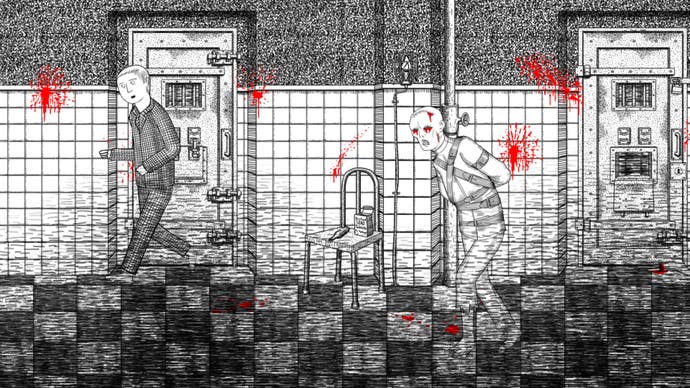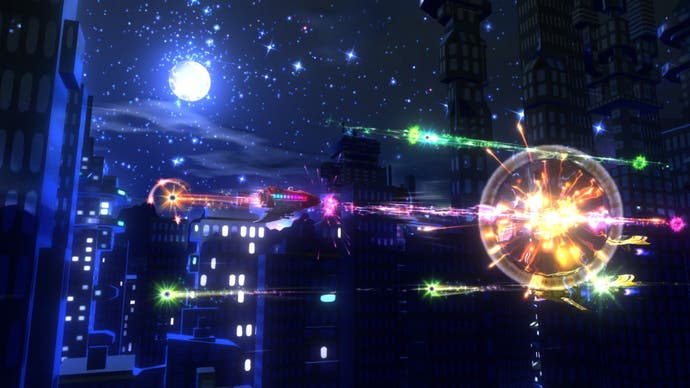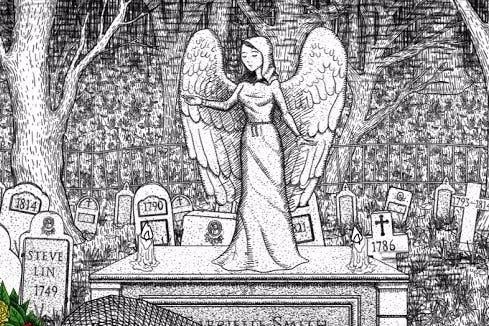How Neverending Nightmares diminished its creator's nightmares
Sales figures revealed. New game teased.
Matt Gilgenbach's semi-autobiographic mental madhouse Neverending Nightmares was borne of tragedy. After Gilgenbach and his development partner Justin Wilder spent $140K and four years of 40-hour work weeks on the rhythm-action shmup hybrid Retro/Grade, the game sold so poorly that it failed to break even. This led Gilgenbach into a deep depression, so he decided to make a game about his horrifying intrusive thoughts called Neverending Nightmares. It's a risky proposition to make a game about your darkest, most disturbing thoughts, but by creating it Gilgenbach managed to save himself from the funk that he was in, both mentally and financially.
"It definitely felt good to express myself and my struggles to the world," Gilgenbach tells me in a Skype interview. "There was a positive reception. I think a lot of people understood where I was coming from, and had similar experiences. So that was really positive for me."

"Also, I've been able to sort of exorcise some demons that have haunted me," he adds. "Due to my mental illness I have these intrusive thoughts of really horrible images of self-harm, so I've been able to put them into the game and I think once they were in the game they sort of lost some of their power, some of the hold they had on me."
That being said, he's not completely better. These sorts of things remain a struggle indefinitely. "I don't think there's a cure for mental illness and I think that's something worth mentioning. It's all about gaining coping skills to deal with it. And my mind will always sort of work in a different way than most people's. It will always be drawn to the negative things and dwell on them. But a lot of recovery and getting better is about gaining skills to deal with them and keep them in check. So I think having made the game I'm better, but I'm not cured."
Besides being able to express himself through Neverending Nightmares, Gilgenbach was able to assure himself that he has the chops to make a living as an independent game developer after the financial fiasco that was Retro/Grade. While far from a breakout hit, Neverending Nightmares made enough to keep Gilgenbach's studio, Infinitap Games, afloat. "It's not like it was a topseller on Steam, but we did well enough that the company is still in business and we're working on a new game," he says.
Gilgenbach clarified that Neverending Nightmares sold roughly 22K copies across all platforms and grossed somewhere in the neighborhood of $250K. That's before Steam, GOG, Humble and Ouya took their cut of about a third. Divide that by a four-person studio with a little bit of contributor help working over the course of roughly 21 months and the result isn't especially profitable on its own. However, Neverending Nightmares raised over $200K on Kickstarter once you factor in Ouya's old Free the Games Fund promotion that matched the minimum goals of successfully funded Kickstarter campaigns. That largely supported the studio through Neverending Nightmare's development, while its sales are paying for pre-production on the team's next game.
And what is Infinitap's next game, you ask? Gilgenbach is cagey on the details, but he teases a rough outline of it. "We're definitely interested in sticking in the genre of horror," he says. "We're looking at developing on more of the interesting aspects of Neverending Nightmares, but we want to present a brand new story and a brand new art style.
"The art style is very distinctive for Neverending Nightmares and we'd like to continue to make games that really stand out with distinctive art. This time it's going to be this greyscale watercolour thing we've been working on instead of the pen lines."
Gilgenbach doesn't think the studio made enough from Neverending Nightmares to fully fund this next project - which is his ultimate goal as an independent developer - but he's hopeful about starting up another crowdfunding campaign.

"We're definitely looking at Kickstarter," he says. "At least for me, Kickstarter has definitely been a really valuable development tool. Because I have people to answer to and I can bounce ideas off of, and I can keep them in the loop on what I'm working on. I think that's really helpful. I worry sometimes that it's easier to let things slip and miss deadlines if you're not answering to people. If you don't have people breathing over your neck and making sure things are going the right way."
"That sounds really negative," he laughs. "I don't mean to have a negative connotation to Kickstarter backers. It's really great having that community supporting you and wanting to know what you're doing and what not. And I think they're willing to give you the benefit of the doubt. With publishers there's so many other things. Maybe they'll just change the focus of their business and drop your project because it's not in line with their current business expectations. So it's a much better experience than with publishers."
And what about Kickstarter fatigue? The crowdfunding site has been inundated with independent games over the last few years, making it hard to stand out.
"I think Kickstarter is all about the project," Gilgenbach states. "I don't think it's fatigue so much as less reasons to be excited about Kickstarter. I don't feel I got burnt out by Kickstarter, but some things are less exciting because they've been done before. So it's scary trying to Kickstart something and do it in an effective manner so that it can get people excited."
He notes that Five Nights at Freddy's was originally a Kickstarter project that didn't get a single backer. Granted its developer, Scott Cawthon, pulled the plug on the campaign after only three days, but that's still a dismal look at those three days for a game that would later become so massively popular that it's being optioned as a feature film.
"I think that's really the challenge: creating something people will get really excited about," he says. "A lot of it is just can you present it in such a way that people say 'I have to have this!' I think that's often a tough proposition to make."


